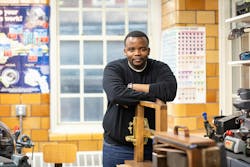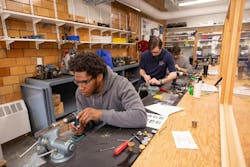The Locksmithing & Security Technology (LK) program at the North Bennet Street School (NBSS) in Boston is quietly turning out highly trained and skilled new locksmiths each year, providing that desperately needed path for young people, veterans and others to have a successful career in locksmithing. Eddy Dacius, who graduated from NBSS in 2013, has been the department head and instructor for the program since 2021, and exemplifies the type of well-rounded, hardworking professional the school sends out into the locksmithing world each year.
In addition to running his own company, Dacius Facilities Management, he is also a member of the ALOA Security Professionals Association, is an ALOA Fire Door Inspector, and has a degree in Project Management. “I am thankful for my role as head of the program here at the North Bennet school 10 years after I graduated,” Dacius reflects.
As Dacius points out, there are so many incredible success stories like his coming out of the NBSS, which is a testament to how comprehensive and effective the program is in preparing students for a career in locksmithing.
“We have one recent graduate who he's working at a university now and is making $80,000 a year straight from the program,” says Dacius, noting that NBSS provided this particular graduate with the opportunity to earn five certifications in addition to their diploma as part of the training. “That's why certification is huge for us within the program where we partner with different companies in the industry, such as Axis Communications, dormakaba and Allegion, for example, to offer these certifications.”
Training Tomorrow’s Locksmiths
The comprehensive Locksmithing & Security Technology program allows students to work in the field even as they develop critical skills. In the hands-on, nine-month program (900 total hours), students study with an experienced locksmith in small classes. The program provides a firm grasp of the fundamentals, and students practice locksmithing through a combination of classroom theory, lectures, demonstrations, hands-on benchwork, surveying, and installation. Graduates leave with the ability to service and repair all types of residential and commercial door-locking devices, while also being familiar with security technology, including electronic access control systems.
The first semester is devoted to learning how to make keys, copying keys, taking locks apart and putting them back together, and changing codes for electronic security systems, while the second semester focuses on learning how to install locks and accompanying hardware, and even how to open a safe without a combination.
The program allows students flexibility and the ability to hold jobs while earning a diploma, as they train from 7:30 a.m. to 12:30 p.m., five days a week, with afternoons free, Dacius points out. Given the small class sizes of around a dozen or so students, the program also gives students individualized attention.
Graduates of the Locksmithing & Security Technology program are trained to perform all basic locksmithing tasks with minimum supervision to satisfy customer demand and to meet standards set by the locksmithing industry, Dacius explains. They understand how to service and repair all mechanical residential and commercial locks and door hardware, set up a master key system, install locks, service automotive locks and open safes without knowing the combination.
“We do a lot of hands-on training and one-on-one instruction at the school and we bring in manufacturer reps, we bring in business owners, all in an effort to give students a feel for what the industry and the business world is really like beyond just books and classroom learning with me,” says Dacius.
Graduates are trained to be familiar with electronic and mechanical access control systems.
“We want to mirror what's out there, which is access control, and then also keep our core knowledge, which is locksmithing,” he explains. “And how we do that is to get people in the industry to come in and talk about the industry, the newest products out there, how they work and are installed.”
For example, in 2024 the school held a panel discussion including industry veterans Ted Brassard, Key Systems manager at Pasek, Jeff Schwartz, co-owner of SECLOCK and David Smith, president of Access Direct Inc., in addition to NBSS alumni Jonathan Nir (LK ’17), owner of Bolt Lock & Key and DJ Dabenigno (LK ’05), owner of Dabbs Lock. The panelists discussed how they each got into the trade, gave advice for aspiring locksmiths, and the great need to train more skilled workers.
As Dacius points out, the program strikes a balance between theory and practice. For example, students are taken on lock manufacturer factory tours, visit locksmith museums, and are trained in a state-of-the-art facility that is stocked with specialized equipment, hardware, and technology. The NBSS facility includes individual benches for each student, a room for instruction/demonstration, an installation room, a resource library, and a brand-new access control zone.
“Students have an opportunity to use the program software, understand the mechanics, and diagnose issues that arise with access control systems,” says Dacius of the new access control equipment. “For instance, if there’s an issue with a keypad, they’ll be able to go to the software first, and then examine the hardware.”
Overall, Dacius says the program is “very holistic … understanding of the industry to the point where – it's not just about our teaching, but the approach and being able to see firsthand how companies like Sargent are making the latest locks in their factory, or going to the Lock Museum of America in Terryville, or being able to get a scholarship from Yankee (see sidebar) each year and attend their convention … these are best experiences and opportunities somebody can have.”
The program also helps to place students into paid internships so they can accelerate their learning while also getting their foot in the door to a possible career. “We take advantage of any opportunity we can get them to start working and get a feel of the industry.”
The Business of Locksmithing
In addition to the theoretical and practical side of locksmithing, the program also introduces students to the business side of things, including all the areas that they will need to touch when they are running their own business.
“We call it the business of locksmithing because nobody tells you everything you need to do when you start a business,” Dacius explains, noting that security professionals today need to know everything from giving an estimate to balancing the books. “You need to be a negotiator, the installer, the supervisor … there is so much to juggle that you need to understand the business elements to be successful today.”
He continues, “We will give students an idea of what a job could entail, and we show them how to install everything to give students an understanding of what is expected and what skills you need to focus on depending on the avenue they want to take. So, for example, we teach them how to work with safes, with the understanding that, if you have a lock shop, you're probably going to sell and service some safes, so knowing the different grade or type of safe you need is fundamental.”
Looking at the future of the program, Dacius hopes to be able to admit more students each year, starting with a waiting list. “I think there's room for it,” he says, pointing out the goal is to keep pushing out better graduates, while providing more opportunities to those who ordinarily could not be able to attend a program like the one at NBSS.
“And then, also, I need every student to graduate with at least seven certifications – that's my goal,” he continues. “And to continue to offer a comprehensive program that includes the latest knowledge and training in access control to support what we are already doing on the mechanical side of things.”
[sidebar]
The Yankee Scholarship Foundation Supports NBBS Locksmith Program
Every year, North Bennet Street School (NBSS) receives a generous grant from the Yankee Scholarship Foundation, providing vital scholarships to students in the Locksmithing & Security Technology (LK) program who demonstrate a passion for the craft and a commitment to their future careers. For the 2023-24 academic year, three deserving graduates each received a scholarship of nearly $7,000, helping them gain a transformative education aligned with their career goals.
“The Yankee scholarship is really important for us each year and one that we value greatly beyond just the financial part,” says Dacius, who also attends the convention every year. “Going to the Yankee Security Convention is a game changer; it not only gives you access to the latest insights but also connects you with experts and innovators who are shaping the future of security. For our students at NBSS and anyone new to this industry, it’s the best way to get a head start.”
NBSS assists students with the costs of attending the convention and they are encouraged to attend educational seminars, networking events, and the trade show.
“North Bennet Street School is an excellent partner in the Yankee Scholarship Foundation’s directive to help train locksmiths for employment,” says Ginny Newbury, Yankee Board member and a member of the NBSS Program Advisory Committee for the LK program. “The program exposes students to many of the opportunities and challenges they will face in the trade, and many of their graduates work throughout New England in institutional, commercial, residential, and automotive locksmithing. We see some alumni of the school with thriving businesses who are now hiring new graduates.”
Asia Baker, an Army veteran who received the Yankee scholarship and graduated from the LK program in 2024, is a shining example of what the partnership can provide for those who are looking to advance their careers.
“The exposure I gained through the scholarship was critical to advancing in this field,” Baker says. “Not only did the financial support ease the transition into full-time locksmithing, but it also opened doors to connections and opportunities that might have otherwise remained out of reach.”
About the Author
Paul Ragusa
Senior Editor
Paul Ragusa is senior editor for Locksmith Ledger. He has worked as an editor in the security industry for nearly 10 years. He can be reached at [email protected].

